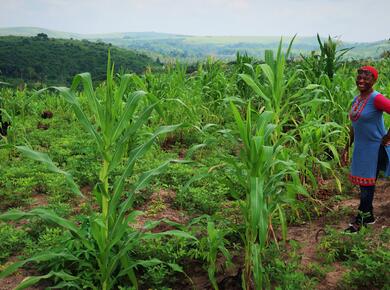Posted: November 5, 2020
Like the chambers of a heart, the four MWC commissions serve the global community of Anabaptist-related churches, in the areas of deacons, faith and life, peace, mission. Commissions prepare materials for consideration by the General Council, give guidance and propose resources to member churches, and facilitate MWC-related networks or fellowships working together on matters of common interest and focus. In the following, one of the commissions shares a message from their ministry focus.
What does “following Jesus” mean? What does it mean to follow the One who is our Hope?
These questions take on special importance at a time when people around the globe are worried about the fate of our earthly home. Even as we struggle with the immediate effects of the coronavirus, we are facing a more encompassing crisis we see in the rapid and alarming changes in our environment.
For some of us “hope” means counting on Christ’s coming to rescue us from catastrophe. We then too quickly give up on God’s beloved creation.
For others “hope” means active engagement, not only in changing our ways, but in trying to get our societies and political leaders to change their ways. We ourselves, rather than Jesus, too easily become “our hope.”
Our agenda as Jesus followers
Anabaptists have drawn a clear line from Jesus’ call to love the enemy to refusing participation in war. More, we have come to see the call to follow him as a summons to work actively for peace in our world, including calling on governments to change their violent ways.
But how do we follow Jesus in relation to a global crisis that did not exist in the world he taught in? Living in a preindustrial world, Jesus did not address climate issues or even creation care more generally. Does that mean that the New Testament has nothing to say to us about our fragile and endangered environment?
Not for a moment.
“Following Jesus” would need to be re-envisioned again and again as times and circumstances changed, up to our own day. As Acts shows us, Jesus’ circles of followers quickly moved beyond the countryside of Galilee and Judea, becoming “global,” taking root in cosmopolitan cities like Ephesus, Corinth and Rome.
Christ-hymns
Yes, Jesus was remembered as a healer, teacher and story-teller, as we see in the Gospels. But his followers came to see him and confess him as cosmic Lord and Saviour, hope of all creation, as they expressed in great “Christ-hymns.”
In one such hymn we read of the Logos, the “Word,” that was not only with God, but was God, by and through whom “all things came into being” (John 1:3). The Gospel of John introduces us to Jesus as that Logos becoming flesh and “tenting” with us (1:14).
In another great Christ-hymn, Jesus is worshiped as the “icon” of the invisible God, the firstborn of “all creation” through whom and for whom “all things” in the universe were created. Through him God was pleased to reconcile “all things,” making peace through the blood of his cross (Colossians 1:15-20).
These hymns remind us that if we wish to be true to the Jesus of Scripture, we must not choose between the Word through whom all things were made and the Word that became flesh in Jesus. We must not create a dichotomy between creation and new creation.
The truth that is in Jesus
To follow Jesus is to “learn Christ,” as Ephesians puts it, that is, “the truth that is in Jesus” (4:20, 21). The one in and through whom “all things” are made, is the one in and through whom a saving God gathers all things (Ephesians 1:10). All creation groans in anticipation of Jesus’ followers learning Christ in that fashion, as Paul might have said (to adapt Romans 8:18-25).
While there are many other concerns on our plate as Faith and Life Commission, we have encouraged the establishment of the Creation Care Task Force, and pledge to do our part to strengthen our global family’s capacity to respond faithfully to the climate crisis as hope-filled followers of Jesus.
We have the opportunity to “learn Christ” together as a global family, to strengthen our hope in such a way that it fully engages us in God’s love for creation. It will take courage, imagination, commitment to discipleship and trust in the One who promises us a “future with hope” (Jeremiah 29:11).
—Mennonite World Conference release by Thomas R Yoder Neufeld, chair of the Faith and Life Commission. He is a member of First Mennonite Church, Kitchener, Ontario, Canada.
Click here to read more about the Creation Care Task Force. |
We need your input!
The Creation Care Task Force requests that you take the creation care survey; we need your input! As the task force begins our work, it is important we hear from you, as a congregation within Mennonite World Conference, about issues of creation care such as climate change. Your feedback is critical as we create a plan to work on creation care issues which churches feel are most important, and as we provide resources for churches who want to engage with issues like climate change and other forms of environmental degradation which impact our congregations.
Please take about 15 minutes individual, or together with other members of your congregation, to fill out this survey.
Your input is highly valued; thank you for participating!



Join the Conversation on Social Media
FacebookTwitterInstagramFlickrYouTube